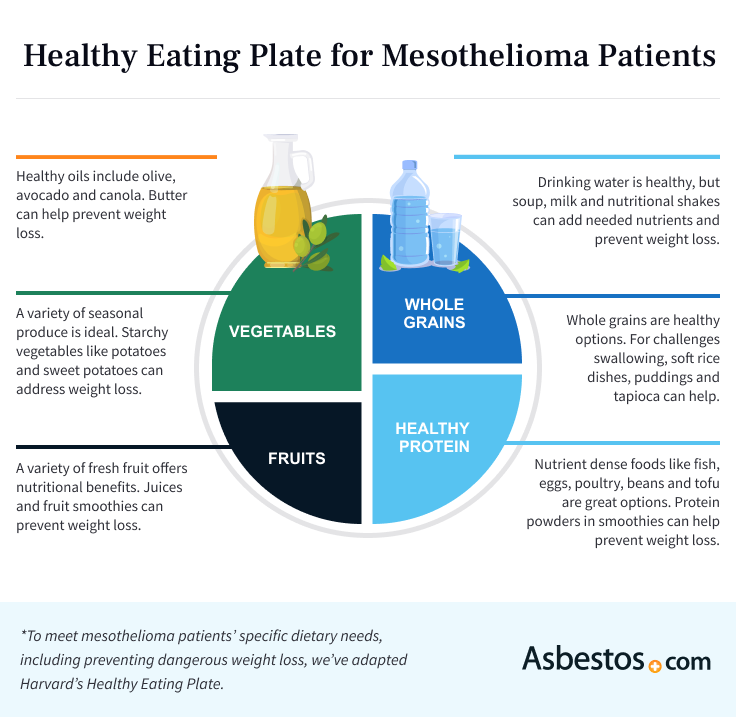
Diana Zuckerman is the founder and president of the National Center for Health Research. She develops prevention strategies and treatments for programs such as the Cancer Prevention and Treatment Fund.
Diets for mesothelioma patients should avoid alcohol, processed meat, red meat and saturated fats. Mesothelioma patients should include more lean proteins in their diet such as poultry, fish, eggs, beans or peanut butter, incorporating them into each meal as possible.
Diet and nutrition can help strengthen the immune system, counter some of the effects of cancer and maintain energy levels. Consuming more proteins, for example, may help restore tissue mesothelioma damages.
Top Mesothelioma Diet Tips
Not only does what you eat matter when managing mesothelioma, but when you eat can also make a difference. Eating smaller portions throughout the day can help you get the nutrients you need without feeling too full or overwhelmed. It’s easy to forget to eat when you’re not feeling well. Setting a timer to remind you to eat a little something every 3 hours can help.
Maintaining a healthy weight can reduce complications from treatment. Certain foods can also help reduce treatment side effects like nausea or mouth sores. Before dietary changes are made, consult your mesothelioma doctor.
A healthy, balanced diet can help you respond better to treatment and reduce its side effects. For example, omega-3 fatty acids in fish oil may help reduce inflammation and improve heart health. This effect can benefit people with a higher risk for heart problems.
People with mesothelioma should consume a balanced diet rich in protein, vitamins and minerals. Mesothelioma survivors may also be directed to limit whole grains or avoid other types of food during and while recovering from treatment.
A common dietary concern for people with mesothelioma is eating too few calories, which are essential to aid recovery, support immunity and fight fatigue. It’s important to keep your energy levels up and give your body the nutrients it needs to heal.

Learn about the latest mesothelioma treatments and clinical trials in our updated 2026 guide.
Get Your Free GuideMesothelioma treatment can affect your ability to eat as you usually do. Alterations to your diet and eating habits can help you cope with treatment and its side effects. Taking proactive measures to meet nutritional needs for each type of treatment can help.
Diet and Mesothelioma Treatment
Some aspects of treatment may affect how you get nutrition. For example, abdominal surgeries can complicate eating and digestion. Some peritoneal mesothelioma patients may receive nutrition intravenously shortly after abdominal surgery.
More than 95% of my mesothelioma patients talk to me about losing weight. We get nutrition involved before we start our multimodality treatment program. We assess how much protein and how many calories they need. To get treatment, you have to have some type of nutrition program involved.
Some foods contain nutrients that may support recovery after mesothelioma treatment. Speak with your doctor about which foods or nutrients they recommend you add to your current diet.
Foods Aiding in Recovery
While antioxidants are generally considered part of a healthy diet, they neutralize free radicals. Many chemo drugs use free radicals to attack cancer cells. Chemo patients may be advised to avoid foods high in antioxidants. Speak to your doctor about possible interactions.
You may want to avoid certain foods or nutrients that could worsen side effects or weaken your immune system. Foods that are difficult to digest can exacerbate mesothelioma-related or treatment-related digestive problems.
Foods to Avoid With Mesothelioma
Some foods, such as grapefruits, can negatively interact with chemo and other mesothelioma drugs. Your doctor will tell you about specific foods that may interact with your medications.
How important is nutritional health to mesothelioma treatment
Nutrition itself for mesothelioma is one of the under under utilized, under studied, less known factors that we see because in the majority, in fact, more than ninety five percent of my patients with mesothelioma. Besides the shortness of breath and some of the chest pain, really every single family member or every single patient just like, yeah, I've been losing weight. Why am I losing weight?
It's not a cancer in the in the in the GI tract. Right? They're they it's not a tumor affecting their esophagus. This is in the plural lining. Something about mesothelioma, and it hasn't it's been studied a little bit, but one, the the there's proteins that we think that are secreted by mesothelioma that are more active in causing weight loss than other cancers per se. But number two, patients just don't feel well and they're so fatigued that they don't wanna eat because if you're short breath and out of breath and in pain, you're not gonna wanna eat.
And so that's probably the more common. And so nutrition is so important because most mesothelioma patients are not gonna weigh three hundred four hundred pounds. They're usually gonna be in the low one hundreds and very, you know, very thin.
And so the idea behind getting nutrition involved early even before we start our multimodality treatment program is important. We will, a hundred percent of the time now, recommend a nutritionist prior to any type of treatment to assess, you know, how much protein they need, how much calories they need. And we do think that that's important because most of the mesothelioma patients present with very, poor appetite, poor nutrition, and weight loss. So I think to even get treatment, you have to get the medical, surgical, immunotherapy, radiation treatment.
You have to have some type of nutrition program, involved in that.
What makes the Asbestos.com nutrition guide unique for mesothelioma patients?
[MUSIC PLAYING] TEJAL PAREKH: The nutrition guide that was created is really exciting because it’s so unique. It’s one of a kind for patients and their caregivers because it’s kind of an all in one. A lot of times, patients will go to a variety of websites trying to find the answers that they’re looking for for how to handle side effects from chemotherapy, to radiation, to surgery, and we address all of those. In addition, we provide recipes that are easy to make, and hopefully, easy to eat. And that’s what makes the book so unique for our patients with mesothelioma.
Before taking any dietary supplements, it’s important to note that nutritional and herbal supplements usually are less well-researched than mainstream medications. This makes it even harder to predict what problems they may cause when combined with chemo.
Discuss any supplements you’re considering with your mesothelioma care team before taking them. They can provide guidance on what’s safe to take. They’ll also tell you which ones to avoid during mesothelioma treatment.
Top Supplements for Mesothelioma Patients
Dietary supplements can interact with cancer drugs. These interactions may make them less effective or cause harmful side effects. High levels of vitamin C or E can interfere with radiotherapy. St. John’s wort, ginseng and garlic supplements may also interfere with chemo drugs.
Even traditional supplements doctors may recommend can have harmful interactions with mesothelioma therapy. Mesothelioma survivors on chemo are often prescribed folic acid and B12 supplements to reduce toxic side effects but, vitamin B6 supplements can interact negatively with cisplatin.

Ease your mesothelioma symptoms with the right food. See recipes designed for you.
Get My Free GuideMeal planning can alleviate the stress associated with food shopping. Meal prepping will also make crafting and following your mesothelioma diet easier.
As a caregiver, stock up on your loved one’s favorite foods when food shopping. Buy items essential for meeting their nutritional needs. This can reduce the need to shop often.
The U.S. Department of Agriculture retired the Food Guide Pyramid years ago and replaced it with My Plate. However, My Plate isn’t designed for people with cancer, so the Harvard School of Public Health created the Healthy Eating Plate. It’s a better starting place for developing a diet for people with mesothelioma.
The effects of cancer and treatment can make it challenging to eat. Mesothelioma survivors also have specific nutritional needs. You’ll need to adjust the Healthy Eating Plate guidelines during cancer therapy to find the best mesothelioma diet for you.
Replace green vegetables, salads and other lower-calorie foods with starchy vegetables such as potatoes and sweet potatoes. For most people with mesothelioma, it’s helpful to increase the protein portion of the plate and decrease whole grains a bit. Sometimes, you may need to add a high-protein, high-calorie liquid nutrition supplement.

Eating enough and getting proper nutrition can be challenging if you have mesothelioma. Patients may have difficulty eating and require additional nutrients to maintain their weight and strength.
Tips for Getting Proper Nutrition
If you don’t own a juicer, you can create a juice with a blender and cheesecloth. Blend fruit or vegetables with filtered water, then strain with a cheesecloth available at most grocery stores.
Try to create a joyful or relaxing setting, enjoying food with friends or family. This may reduce stress around eating and lead to more enjoyment while consuming the foods you need.
People with mesothelioma may struggle to maintain their muscle mass and strength. Eating protein-rich foods regularly is important to maintaining muscle and fighting fatigue.
Protein examples include: tofu, tempeh, spinach, beans, nuts, Greek yogurt, cheese, eggs, fish, poultry and lean red meat. Try to eat more of these foods if you’ve lost weight or strength.
Tips for Eating More Protein
Snacks between meals can include protein like nut butter, roasted nuts, cheese or sliced meats. Desserts made with eggs such as cheesecake, custard and pudding can increase protein consumption.
Maintaining a healthy weight as a result of mesothelioma treatment-related side effects can be a struggle. Adding extra calories to meals can be challenging, but you must get the necessary nutrients to help your body fight cancer.
Tips for Increasing Calories
Maintaining weight and muscle mass helps the body handle the aggressive nature of anticancer therapies. Preparing meals in advance and freezing them into meal-sized portions that are easy to heat can make this less challenging. Talk with a dietitian for assistance with meal planning or preparing a grocery list.
For people receiving mesothelioma treatment, food safety is very important. The U.S. Department of Health and Human Services highlights 4 key steps to keep food safe: clean, separate, cook and chill.
Food Safety Tips
Treatments like chemo and radiation often weaken the immune system, making it harder to fight foodborne bacteria, parasites and harmful germs. Following these food safety steps helps protect you during treatment.
Foodborne illnesses, often called “food poisoning,” can cause serious health problems. To prevent getting sick from food, people with mesothelioma should avoid raw or undercooked meat, poultry, seafood and eggs. Unpasteurized or raw milk and cheeses should also be avoided.
Food Poisoning Side Effects
It’s important to stay informed about food recalls and outbreaks of food-related illnesses. Avoid eating or touching any foods suspected of contamination.
For example, the USDA’s Food Safety and Inspection Service announced a recall for 32,000 pounds of meat in August 2025 that bore a false USDA mark of inspection. The meat included chorizo, pork chops and ribs shipped to restaurants and stores across the country. The agency noted in its statement, “Any product bearing the false establishment number ‘Est. 1785’ should be considered misbranded and unsafe to eat.”
Mesothelioma doctors recommend patients eat foods rich in nutrients such as eggs, fruit and salmon. They also recommend a diet high in protein with starchy vegetables and plenty of water to counter the effects of mesothelioma treatment.
A registered dietitian can assess your nutritional needs and help you develop a personalized mesothelioma nutrition plan. They’ll base a program on your needs, preferences and health status. A registered dietitian can also help you navigate any dietary restrictions or challenges that may arise during your mesothelioma treatment.
Yes, some foods may interact with chemo drugs, which can impact their effectiveness or cause side effects. Supplements may also interfere with cancer treatments. A registered dietitian can guide you on potential interactions. Discuss any supplements or dietary changes with your health care team.
No mesothelioma cure exists yet, but a healthy diet can offset the adverse effects of cancer therapy and improve your treatment outcome. Eating the right foods can make your treatment recovery more manageable.
Asbestos exposure is the primary cause of mesothelioma. While a healthy diet may not be able to counteract all of the risks from heavy, prolonged asbestos exposure, it can improve overall health and strengthen the body’s defenses.
Unexplained weight loss is one of the signs of advanced mesothelioma. Lack of appetite or persistent nausea, which are symptoms of peritoneal mesothelioma, can also cause weight loss.
Stay up-to-date on treatment, research, clinical trials, doctors and survivors
The information on this website is proprietary and protected. It is not a substitute for professional medical advice, diagnosis or treatment. Any unauthorized or illegal use, copying or dissemination will be prosecuted. Please read our privacy policy and terms of service for more information about our website.
This website and its content may be deemed attorney advertising. Prior results do not predict a similar outcome.
The Mesothelioma Center’s claim as the most trusted resource is based on our more than 150 5-star Google and BBB reviews. Our organization also helps more than half of all mesothelioma patients annually diagnosed.
Your web browser is no longer supported by Microsoft. Update your browser for more security, speed and compatibility.
If you are looking for mesothelioma support, please contact our Patient Advocates at (855) 404-4592
The Mesothelioma Center at Asbestos.com has provided patients and their loved ones the most updated and reliable information on mesothelioma and asbestos exposure since 2006.
Our team of Patient Advocates includes a medical doctor, a registered nurse, health services administrators, veterans, VA-accredited Claims Agents, an oncology patient navigator and hospice care expert. Their combined expertise means we help any mesothelioma patient or loved one through every step of their cancer journey.
More than 30 contributors, including mesothelioma doctors, survivors, health care professionals and other experts, have peer-reviewed our website and written unique research-driven articles to ensure you get the highest-quality medical and health information.
My family has only the highest compliment for the assistance and support that we received from The Mesothelioma Center. This is a staff of compassionate and knowledgeable individuals who respect what your family is experiencing and who go the extra mile to make an unfortunate diagnosis less stressful. Information and assistance were provided by The Mesothelioma Center at no cost to our family.LashawnMesothelioma patient’s daughter


Parekh, T. (2025, December 22). Mesothelioma Diet & Nutrition. Asbestos.com. Retrieved February 6, 2026, from https://www.asbestos.com/treatment/nutrition/
Parekh, Tejal. "Mesothelioma Diet & Nutrition." Asbestos.com, 22 Dec 2025, https://www.asbestos.com/treatment/nutrition/.
Parekh, Tejal. "Mesothelioma Diet & Nutrition." Asbestos.com. Last modified December 22, 2025. https://www.asbestos.com/treatment/nutrition/.

Diana Zuckerman is the founder and president of the National Center for Health Research. She develops prevention strategies and treatments for programs such as the Cancer Prevention and Treatment Fund.
Our fact-checking process begins with a thorough review of all sources to ensure they are high quality. Then we cross-check the facts with original medical or scientific reports published by those sources, or we validate the facts with reputable news organizations, medical and scientific experts and other health experts. Each page includes all sources for full transparency.
Please read our editorial guidelines to learn more about our content creation and review process.
